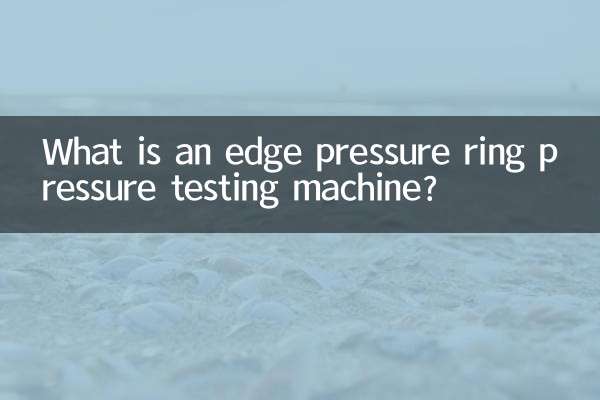What is a high-precision tensile testing machine?
In the fields of industrial manufacturing, material science and product quality testing, high-precision tensile testing machines are indispensable equipment. It can accurately measure various parameters of materials in mechanical property tests such as tension, compression, and bending, and is widely used in the quality assessment of metals, plastics, rubber, textiles and other materials. This article will introduce in detail the definition, working principle, application fields and comparison of popular models in the market of high-precision tensile testing machines.
1. Definition of high-precision tensile testing machine

A high-precision tensile testing machine is a precision instrument used to test the mechanical properties of materials. It can measure key indicators such as strength, elastic modulus, and elongation at break of materials under stress. Its core features are high precision, high stability and versatility, which can meet the strict requirements of different industries for material performance testing.
2. Working principle
The high-precision tensile testing machine applies tension or pressure to the specimen by driving the fixture through a motor or hydraulic system, and collects force and displacement data in real time through high-precision sensors. After computer processing, these data generate stress-strain curves to analyze the mechanical properties of the material.
| components | Function description |
|---|---|
| Drive system | Providing tension or pressure, usually an electric motor or hydraulic system |
| sensor | Real-time measurement of force and displacement with accuracy within 0.5% |
| control system | Adjust test speed, direction and data collection frequency |
| data processing system | Generate test reports and curves to support multiple data analysis functions |
3. Application fields
High-precision tensile testing machines play an important role in multiple industries. The following are its main application areas:
| Industry | Application scenarios |
|---|---|
| metal material | Test the tensile strength and yield strength of metal rods, wires and plates |
| Plastics and Rubber | Evaluate elastic modulus, elongation at break, and tear resistance |
| Textiles | Measuring the tensile strength of fibers, yarns and fabrics |
| automobile manufacturing | Test the mechanical properties of components such as seat belts and tire cords |
| construction industry | Test the tensile strength of steel bars, concrete and other construction materials |
4. Comparison of popular models in the market
The following is a comparison of several high-precision tensile testing machine models that are popular on the market recently and their main parameters:
| Model | maximum load | Accuracy | Test speed range | Price range (10,000 yuan) |
|---|---|---|---|---|
| Instron 5965 | 50kN | ±0.5% | 0.001-1000mm/min | 25-35 |
| Zwick Roell Z050 | 50kN | ±0.5% | 0.001-2500mm/min | 20-30 |
| MTS Criterion | 100kN | ±0.5% | 0.001-500mm/min | 30-40 |
| Shimadzu AGS-X | 10kN | ±0.5% | 0.001-1000mm/min | 15-25 |
5. How to choose a high-precision tensile testing machine
When choosing a high-precision tensile testing machine, you need to consider the following factors:
1.Testing requirements: Determine the maximum load, accuracy and test speed range based on the type of material and testing standards.
2.budget: The prices of different brands and models vary greatly, so you need to choose equipment with high cost-effectiveness based on your budget.
3.After-sales service: Choose a brand that provides comprehensive technical support and after-sales service to ensure long-term stable operation of the equipment.
4.Extended functions: Some high-end models support high temperature, low temperature and other environmental simulation tests, which can be selected according to actual needs.
6. Future development trends
With the advancement of intelligent manufacturing and Industry 4.0, high-precision tensile testing machines are developing in the direction of intelligence, automation and data interconnection. Future tensile testing machines will pay more attention to user experience and integrate artificial intelligence algorithms to achieve more efficient data analysis and failure prediction.
In short, high-precision tensile testing machines are indispensable testing equipment in modern industry, with a wide range of applications and high technical content. Choosing the right equipment can not only improve the accuracy of product quality testing, but also save costs and improve production efficiency for companies.

check the details

check the details